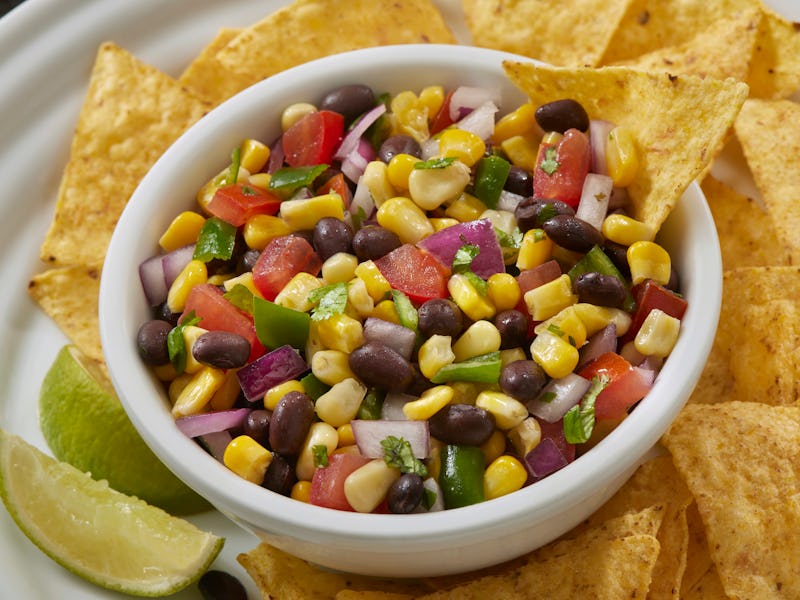Eating More Of This Type of Protein Could Help You Age Better
Get munching for some serious health gains.

We’ve got two weeks left of Veganuary — the month-long challenge to temporarily give up meat and meat products — and if you haven’t started yet, there’s no better time than the present. Your future self’s healthy body will most definitely thank you, or so says science.
According to a study published Wednesday in The American Journal of Clinical Nutrition, researchers at Tufts and Harvard University found eating a diet heavy on plant-based proteins and light on animal ones contributed to healthy aging, particularly among those assigned female at birth. This finding was based on data analyzed from the Nurses’ Health Study, a prospective cohort study of over 120,000 registered nurses whose lifestyle and health data were collected since 1976.
“Consuming protein in midlife was linked to promoting good health in older adulthood,” Andres Ardisson Korat, the study’s lead author and a research scientist at Tufts University’s Jean Mayer USDA Human Nutrition Research Center on Aging, said in a press release. “We also found that the source of protein matters. Getting the majority of your protein from plant sources at midlife, plus a small amount of animal protein, seems to be conducive to good health and good survival to older ages.”
More plants equals better health
There’s been a lot of hype — not unwarranted — behind plant-based diets. Studies upon studies find that eating more fruits, veggies, whole grains, nuts, and seeds can slash one’s risk for and even reverse the damage wrought by chronic maladies like heart disease, Type 2 diabetes, obesity, and certain types of cancer.
The new study adds to this growing body of research but specifically investigates how dietary protein from plants may relate to healthy aging, which, as the researchers write in their paper, hasn’t been explored nearly as much.
As we age, keeping up with our protein intake is important for healthy physical and cognitive functioning, although the why isn’t entirely clear. (It may have to do with biological mechanisms involved in energy metabolism.) Where the protein comes from seems to matter. Some studies have found that eating animal protein during your middle age years comes with a risk of early death, especially from chronic diseases. Other studies find older adults who eat more plant-based proteins are less likely to become frail.
To get to some more definitive answers, Ardisson Korat of Tufts University and his colleagues turned to the Harvard-based Nurses’ Health Study. The amount of plant and animal-based protein in one’s diet was gleaned from questionnaires collected every four years from 1984 to 2016.
If someone’s diet included bread, vegetables, fruits, pizza (weirdly enough), cereal, any baked items, mashed potatoes, nuts, beans, peanut butter, and pasta, those were considered plant-based protein sources. Meat-based protein sources were beef, chicken, milk (which included dairy products like cheese, yogurt, and ice cream), and fish as well as other seafood. How much of either protein source consumed was estimated for the nearly 49,000 participants included in the study.
The physical and mental health of the participants — gleaned from medical records, pathology reports, telephone interviews, and supplementary questionnaires — was compared against their dietary protein intake. The researchers specifically homed in on chronic diseases such as certain types of cancer, Type 2 diabetes, heart disease, stroke, kidney failure, chronic obstructive pulmonary disease, Parkinson’s disease, multiple sclerosis, and amyotrophic lateral sclerosis (or ALS).
The researchers found eating more protein, in general, was linked to better odds of aging, but it was significantly more for individuals who were eating plant-based versus animal-based protein. Additionally, swapping out three percent of your energy intake from an animal or dairy protein, carbohydrate, or fat for a plant protein of equivalent calories boosted the odds of healthy aging even more, anywhere between 1.22 to 1.58 times.
“Those who consumed greater amounts of animal protein tended to have more chronic disease and didn’t manage to obtain the improved physical function that we normally associate with eating protein,” said Ardisson Korat.
The case for a plant-based diet continues
The benefit derived from plant protein might not be in the protein itself, the researchers say, but in other nutrients found in higher proportions in plants, such as dietary fiber (known to lower blood cholesterol), micronutrients, and antioxidants like polyphenols.
The study does come with some limitations. For one, participants were predominantly white, which may limit the generalizability of the findings to other populations. Moreover, this is an observation study, which means there’s a chance there were other mitigating factors the researchers didn’t measure or take into account influencing the results. This is especially true for the different kinds of food participants got their protein from, particularly plant sources.
“The data from the study tended to be very homogeneous in terms of demographic and socioeconomic composition, so it will be valuable to follow up with a study in cohorts that are more diverse,” said Ardisson Korat. “It’s a field that is still evolving.”